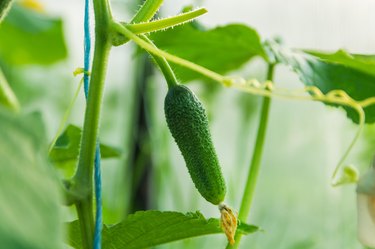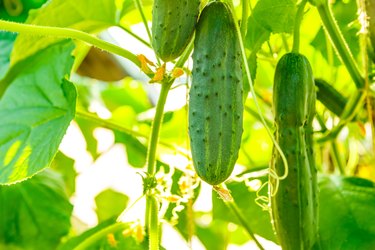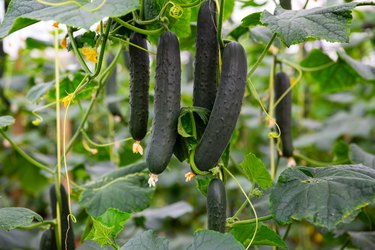
Growing cucumber plants (Cucumis sativus) brings a tasty reward of crisp, flavorful fruits picked when they're perfectly ripe. The plants are annual vines that are usually trouble-free and simple to grow, but occasionally yellow spots may appear on their leaves, fruits or stems; a sure sign of trouble. Identifying the cause and taking quick action can help save the plants and your cucumber fruit crop.
Yellow Spots From Fungal Infections
Video of the Day
Several fungal disorders can cause yellow spots on cucumber plants' leaves. These include:
Video of the Day
Mildews
A fungal disease called powdery mildew produces pale-yellow spots on mature cucumber leaves, along with a whitish powder that accumulates in the spots. These areas usually form on leaf undersides or on leaves that are shaded and stay cool. A similar fungal problem, called downy mildew, produces angular, yellow or pale-green spots between leaf veins. Untreated, these mildew diseases can damage the fruits and could cause a vine to wither and die.
Anthracnose
Another fungal disorder, called anthracnose, produces yellow-to-brown spots on cucumber leaves; eventually, the centers of the spots dry and fall out, leaving behind noticeable holes in the foliage. Anthracnose also may damage cucumber stems and fruits, causing sunken, dark spots on the fruits. The disease usually begins to appear in mid- to late summer.
Blight and Scab

Two other fungal problems, alternaria leaf blight and scab, also can affect cucumber vines and cause yellow leaf spots. When a cucumber plant has alternaria leaf blight, tiny, yellow flecks appear on its leaves and eventually join, forming larger, brownish spots with ringlike patterns. If uncontrolled, the problem can cause leaves to dry and die. In scab, irregular-shaped, grayish spots with yellow halos form on the leaves. Eventually, the leaves start looking ragged as the spots dry and fall out.
Prevention and Treatment of Fungal Infections
Allowing foliage to stay wet for long periods promotes these fungal problems. So water each cucumber vine at its base, keeping its foliage dry whenever possible. Clearing away plant debris regularly also helps prevent these problems because moist, rotting foliage under the plants can harbor fungal organisms.
If a cucumber vine already has a fungal disease, prune off the affected parts with sharp shears, cutting into healthy tissue behind the infected parts. Clean the pruning blades with rubbing alcohol before you begin pruning and after each cut to prevent spreading the disease, and dispose of the removed cuttings immediately.
Angular Leaf Spot
A bacterial disease called angular leaf spot can cause straw-yellow spots on cucumber leaves. The spots eventually dry and their centers drop out, leaving behind holes. Soft spots also develop on the cucumber fruits, which can rot entirely.
Prevent this problem by planting cucumber varieties labeled as resistant to angular leaf spot. Keeping the vines dry helps prevent the spread of the disease, as does rotating -- every two years -- where you plant cucumbers.
Cucumber Mosaic Virus

Cucumber vines are susceptible to infection by cucumber mosaic virus, which can cause yellow streaks or spots on the leaves. Sometimes, leaf veins also turn yellow, and you might see odd, yellow or light-green patterns on those leaves or the fruits.
Cucumber mosaic virus has no cure. So check cucumber seedlings carefully for signs of the disease before you purchase the plants. The virus is spread by a small, greenish, crawling insect -- an aphid. If you see aphids, control them by spraying insecticidal soap. Dilute the soap at a rate of 5 tablespoons per 1 gallon of water, and spray the aphid-affected plant until it's dripping with the solution; repeat the treatment every two weeks as needed. Spray up to the day you harvest cucumber fruit, if necessary, but spray only on a windless day when the temperature isn't above 90 degrees Fahrenheit and conditions aren't sunny. If a cucumber vine is severely affected by aphids or the virus, it's best to discard it.